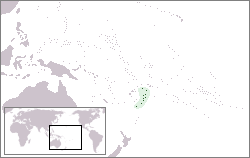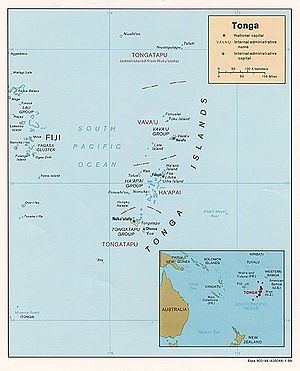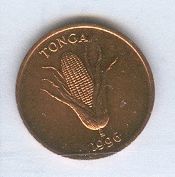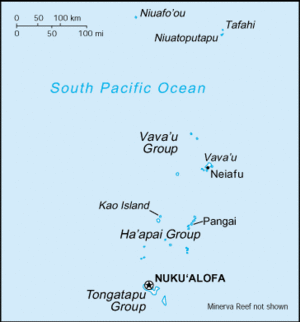Tonga
The Kingdom of Tonga, also known as “The Friendly Islands,” is situated in the archipelago of the same name in the southern Pacific Ocean, about a third of the way on a line running from New Zealand to Hawaii. It lies south of Samoa and east of Fiji. Settled for more than 2,800 years, Tonga is part of the cradle of Polynesian civilisation (along with Samoa and Fiji). Tonga has always retained control of its own government. The monarchy is under pressure from a pro-democracy movement seeking more representation and accountability. Tongan people have made their mark in sports, as creative artists, as hip-hop and opera singers. Everyday life in Tonga is heavily influenced by the Christian faith.
| |||||
| National motto: Ko e Otua mo Tonga ko hoku tofi'a (God and Tonga Are My Heritage) | |||||

| |||||
| Principal languages | Tongan, English | ||||
| Capital | Nuku'alofa | ||||
| King | Taufa'ahau Tupou IV | ||||
| Acting prime minister | Feleti Sevele | ||||
| Area - Total - % water |
Ranked 171st 748 km² 4% | ||||
| Population - Total (2005 est.) - Density |
Ranked 178th 112,422 137/km² | ||||
| Currency | Pa'anga | ||||
| Time zone | Universal Time +13 | ||||
| Independence | 1970 | ||||
| National anthem | Koe Fasi Oe Tu'i Oe Otu Tonga (Oh Almighty God Above, Thou Art Our Lord and Sure Defence) | ||||
| Internet TLD | .to | ||||
| Country calling code | 676 | ||||
Geography
The Tongan archipelago consists of 169 islands, 36 of them inhabited, and is divided into three main groups — Vava'u, Ha'apai, and Tongatapu, which lie along an 800 km north-south line. The largest island, Tongatapu, on which the capital of Nuku'alofa is located, covers 257 km².
Geologically, the Tongan islands are either volcanic in origin rising directly from the ocean floor (Kao and Tofua in the Ha'apai group) or seismically uplifted coral limestone overlaying an older volcanic base (Tongatapu). The active volcanic islands are situated in an approximate north-south line located west of the more populated islands. A new volcanic island broke the ocean's surface in the Ha'apai group during the 1990s.
The climate is subtropical with a warm period (December-April), when temperatures rise above 32 C, and a cooler period (May-November), when temperatures are rarely above 27 C. The annual rainfall rises from 1,700 to 2,970 mm as one moves from Tongatapu in the south to the northerly islands closer to the Equator. The mean daily humidity is 80 percent.
Environmental issues facing Tonga include deforestation, as land is cleared for agriculture and settlement, and damage to coral reefs from starfish and indiscriminate coral and shell collectors. Over-hunting threatens native sea turtle populations. Natural hazards include cyclones, from October to April, and earthquakes and volcanic activity on Fonuafo'ou.
History
WHAT IS LAPITA?
The first settlers in Tonga sailed from the Santa Cruz Islands, as part of the original Austronesian-speakers' (Lapita) migration out of Southeast Asia 6000 years ago. Tonga is the oldest known site in Polynesia for Lapita ceramic ware, which dates back 2800 years. The Lapita people lived and sailed, traded, warred, and intermarried in the islands now known as Tonga, Samoa, and Fiji for 1000 years, before explorers set off to the east and discovered the Marquesas, Tahiti, and other islands. By the twelfth century, Tongans and their paramount chief, the Tu'i Tonga, were known across the Pacific, from Niue to ???Tikopia. Civil war erupted in the 15th century and again in the 17th.
Dutch explorers Willem Schouten and Jacob Le Maire were the first Europeans to arrive in 1616. They visited the northern island of Niuatoputapu. Abel Tasman visited Tongatapu and Ha'apai in 1643. The English Captain Cook visited three times in the 1770s, the first London missionaries landed in 1797, and the Methodist Walter Lawry Buller arrived in 1822.
Taufa'ahau, an ambitious young warrior, strategist, and orator, united Tonga into a Polynesian kingdom by 1845. Holding the chiefly title of Tu'i Kanokupolu, he was baptized with the name King George. With the help in 1875 of missionary Shirley Baker, he declared Tonga a constitutional monarchy; formally adopted the Western royal style; emancipated the serfs; enshrined a code of law, land tenure, and freedom of the press; and limited the power of the chiefs.
Tonga became a British protected state under a treaty of friendship in 1900, when European settlers and rival Tongan chiefs tried to on Fiji) between 1901 and 1952. The friendship treaty and protectorate status ended in 1970 as well as independence from Britain under arrangements made by Queen Salote Tupou III.
Politics
Tonga is a hereditary monarchy. A direct descendant of the first monarch, King Taufa'ahau Tupou IV, his family, some powerful nobles, and a growing non-royal caste of elites live in wealth, with the rest of the population live in relative poverty. A long-standing tradition of reverence for the monarch, and access to free education, and medical care soften the impact of the contrast between the rich and poor.
The executive comprises: Chief of state King Taufa'ahau Tupou IV (since 1965), acting Prime Minister (the elected minister of labour) Dr. Feleti Sevele, and Deputy Prime Minister James C. Cocker (since January 2001). The cabinet consists of 16 members, 12 appointed by the monarch for life; four appointed from among the elected members of the Legislative Assembly, including two each from the Nobles.
The legislative assembly, or Fale Alea, consists of 30 seats, 12 of which are reserved for cabinet ministers, nine for nobles selected by the country's 33 nobles, and nine elected by popular vote. Members serve three-year terms. Elections were held in March 2005. The Human Rights and Democracy Movement of Tonga took seven seats and independents two.
The government of Tonga under King Taufa'ahau Tupou IV claims credit for modernising the economy. But the government has been criticised for a series of poor economic decisions, such as investing in oil prospecting despite geological reports to the contrary, considering disposing of nuclear waste in Tongan territory, selling Tongan protected persons passports, and chartering an unusable Boeing 757. The king has proved vulnerable to speculators. He lost several million dollars to a financial adviser who called himself the king's court jester.
Pro-democracy movement
A pro-democracy movement seeks better representation in Parliament for commoners, who make up the majority. The movement does not aim to overthrow the monarchy. Pro-democracy leaders have been jailed, and in mid-2003, the government amended the constitution to require newspapers to be 80 percent owned by Tongans living in Tonga. The Tongan Times, the Kele'a and the Matangi Tonga lost their licences. Opposition to the bill brought thousands of protestors out into the streets of Nuku'alofa, and prompted calls for aid donor countries Australia and New Zealand to put pressure on the Government. A constitutional commission was set up to study proposals to update the constitution.
Economy
Tonga's economy is characterized by a large non-monetary sector and a heavy dependence on remittances from the half of the country's population that lives abroad, chiefly in Australia, New Zealand, and the United States, as well as foreign aid.
Squash, coconuts, bananas, and vanilla beans are the main crops, and agricultural exports make up two-thirds of total exports. Agriculture involves 65 percent of the labour force of about 34,000 workers. Main export partners are Japan 37.1 percent, China 18.7 percent, and the US 17.7 percent.
The country must import a high proportion of its food, mainly from New Zealand. Main import partners are New Zealand 37.1 percent, Fiji 24.3 percent, and Australia 9.1 percent.
Tourism is the second largest source of hard currency earnings, after remittances, which in the late 1990s, amounted to over $NZ90-million annually.
The country remains dependent on external aid ($5.5-million from Australia, and $2.3-million from New Zealand in 2002), and remittances from Tongan communities overseas to offset its trade deficit.
Much small business, particularly retail establishments on Tongatapu, has become dominated by Chinese immigrants who arrived under a cash-for-passports scheme ended in 1998.
Tonga has a reasonably sound basic infrastructure and well-developed social services.
High unemployment at 13.3 percent in 1996, especially among the young, a continuing upturn in inflation, pressures for democratic reform, and rising civil service expenditures are issues facing the government.
The pa'anga is the unit of currency.
Demographics
Almost two-thirds of the Tongan population, of 112,000 (July 2005), live on its main island, Tongatapu. Although an increasing number of Tongans have moved into the only urban and commercial centre, Nuku'alofa, where European and indigenous cultural and living patterns have blended, village life and kinship ties continue to be important throughout the country.
Tongans, a Polynesian group with a very small mixture of Melanesian, represent more than 98 per cent of the inhabitants. The rest are European, mixed European, and other Pacific Islanders. There also are several hundred Chinese.
Culture
The Tongan language (faka-Tonga) has 100,000 speakers. A verb-subject-object language, Tongan is part of the Polynesian branch of the Austronesian languages, along with Hawaiian, Maori, Samoan and Tahitian, and is the least-changed of those languages. English is also spoken. The English word "taboo" is a loan word from Tongan.
The church has been central to Tongan life. All commerce and entertainment cease from midnight Saturday until midnight Sunday, and the constitution declares the Sabbath to be sacred, forever. According to the 1996 census, 41 percent belonged to the Free Wesleyan Church of Tonga, 16 percent were Roman Catholic, 14 percent belonged to the Church of Jesus Christ of Latter-day Saints (Mormons), the Free Church of Tonga had 12 percent, and others 17 percent. Members of the Tokaikolo Church (a local offshoot of the Methodist Church), Seventh-Day Adventists, Assembly of God, Anglicans, the Baha'i Faith, Islam, and Hinduism are represented in much smaller numbers. There were no reports of atheists.
Tongan culture has strict gender roles. Girls are taught to be submissive and are expected to stay at home. Boys are raised to be independent. Men have more political power, but women are ranked higher in the community. Women and men have equal access to education and health care, and are fairly equal in employment, but women are discriminated against in land holding, electoral politics, and government ministries. The Tongan words for homosexuals are fakaleitī (like a lady) and fakatangata (like a man). When not sexually active, these people are ignored. If sexually active, they are condemned as perverts.
Primary education between ages six and 14 is compulsory and free in state schools. Mission schools provide about 83 percent of education for children aged from five to 12, and 90 percent of those aged from 13 to 17. Higher education provides training for teachers, nurses, and doctors and offers some graduate degrees. There is a small private university, a women's business college, and a number of private agricultural schools. Further higher education must be obtained overseas. Tongans are well-educated, with a 98 percent literacy rate. Fees for secondary education are nominal. Foreign-funded scholarships are available for post-secondary education.
Young Tongans can be heavily influenced by black-American youth culture in their dress, slang, body language and music, especially hip-hop. Rastafarianism is another influence, manifesting in dreadlocks and adapted reggae music.
Tongan performers who have achieved international success include Pauly Fuemoana of OMC (Ōtara Millionaires’ Club), and the operatic tenor Ben Makisi who adapted his knowledge of Tongan musical notation to explore European classical music. Tongan styles of sport, especially in netball and rugby, have influenced the games in New Zealand. All Black Jonah Lomu became a national icon. Tongan-born Filipe Tohi brings Tongan elements to his sculpture and lashing.
Success for a Tongan means the ability to contribute to the extended family and to fulfil community obligations. Respect for seniority, restrained behaviour in the face of need, and sexual propriety by Christian standards are considered important. Having a large family indicates success. Those who send money to their family Tonga are highly regarded.
Tongan diaspora
Many Tongans migrated to Australia, New Zealand, and the United States to seek employment and a higher standard of living. U.S. cities with significant Tongan American populations include East Palo Alto, California, Oakland, California, Los Angeles, California, Salt Lake City, Utah, Honolulu, Hawaii, and Euless, Texas (near the Dallas/Fort Worth metroplex).
Trivia
Captain Cook presented a tortoise to the king, on either his 1773 or 1777 visit. This tortoise, known thereafter as Tui Malila, lived to be either 188 or 192 years old, and was listed in the Guinness Book of Records as the oldest animal on record.
Tonga is where Fletcher Christian forced William Bligh into an open boat during the mutiny on the HMS Bounty in 1789. Bligh briefly went ashore at Tofua, then heavily populated, in search of water. The Tongans rebuffed Bligh and killed a member of his crew, forcing Bligh back out to sea. Bligh and his crew eventually sailed to the Dutch East Indies, setting a record for the longest voyage in an open boat (several thousand nautical miles).
ReferencesISBN links support NWE through referral fees
- ^ The sun finally sets on our men in paradise, published on The Daily Telegraph, 21 March 2005
- ^ Iraq Coalition Troops, published on GlobalSecurity, 18 August 2005
- ^ No resolution in sight in Tonga, published on TVNZ, 30 August 2005
Melenaite Taumoefolau. 'Tongans', Te Ara - the Encyclopedia of New Zealand, updated 11-Jul-2005
External links
- CIA World Factbook: Tonga
- Interactive maps of Tonga
- Map of Tonga
- Official Tongan Government Portal
- Matangi Tonga online— news from Tonga
- Planet Tonga
Credits
New World Encyclopedia writers and editors rewrote and completed the Wikipedia article in accordance with New World Encyclopedia standards. This article abides by terms of the Creative Commons CC-by-sa 3.0 License (CC-by-sa), which may be used and disseminated with proper attribution. Credit is due under the terms of this license that can reference both the New World Encyclopedia contributors and the selfless volunteer contributors of the Wikimedia Foundation. To cite this article click here for a list of acceptable citing formats.The history of earlier contributions by wikipedians is accessible to researchers here:
The history of this article since it was imported to New World Encyclopedia:
Note: Some restrictions may apply to use of individual images which are separately licensed.





